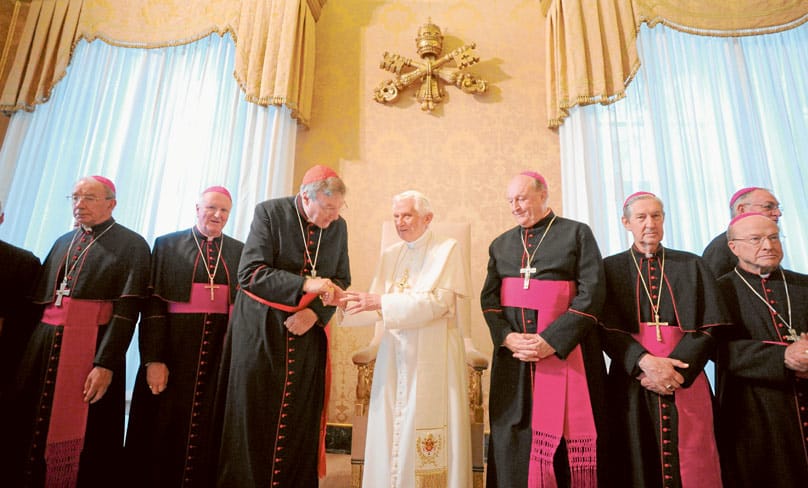
“The Bishops are cowards. They are letting an innocent man stay locked up. They should raise their voices. They should march in the streets. They should do… something!”
I have heard or read these words or variations on them hundreds of times over the past couple of months, since the news of the Cardinal’s conviction became public, and especially since the sentence was handed down and he was imprisoned.
It’s an understandable sentiment, of course. The Cardinal has been a Bishop for more than 30 years, so most of the Bishops would know him quite well. Even if they differ in style or theology or whatever, they would know that his character does not match the crimes for which he is now serving time.
They also know well what it is like to celebrate Sunday Mass in a Cathedral, and the frequent comings and goings of servers and sacristans, choristers and concelebrants.
Hence, they would also know that the circumstances in which these crimes are said to have happened – a Cathedral sacristy with an open door after Sunday Mass – would be most unusual, if not impossible.
If they know all of this, then why don’t they come out and say it? Why all of this language about respecting the decision of the court? Why not just call this out for the persecution that it is?
I get it, I do. But I don’t agree. I don’t think a lack of public commentary equates to “abandoning” the Cardinal, because public commentary is not the only (or even the best) method of showing support. I think the Bishops are doing the right thing by saying very little about the case at the moment, and if you’ll indulge me, I’ll explain why.
It’s an obvious place to start, but any comment about belief in the Cardinal’s innocence would create a lot of negative media for Bishops individually and collectively, and the Church as a whole.
See related article: Monica Doumit: We need saints to rise up
We would be criticised for holding ourselves above the law, for rejecting the verdict of the jury, for disbelieving a victim, and learning nothing from the horrible history of the child sexual abuse scandal.
To get just a taste of what they could expect, have a look at how Archbishop Anthony Fisher was excoriated for publicly suggesting that people wait until the appeal before coming to judgment, or the vitriol levelled at Archbishop Peter Comensoli for saying that he would go visit the Cardinal in prison if given the opportunity.
The counter-argument to this, of course, is that we shouldn’t worry about what the media thinks or does; it is not the job of the Church to be popular, after all. St Paul exhorts us to preach the word in and out of season (2 Tim 4:2), and Bishops in particular have a mandate to teach, govern and sanctify.
But giving their view about the Cardinal’s case does not fall into the threefold office of teaching, governing or sanctifying, because Bishops teach on faith and morals, not on the outcome of the Cardinal’s trial.
Moreover, it would be imprudent and, dare I say, improper, for the Bishops to do so. In years past, Bishops were quick to dismiss complaints from victims of clergy abuse and none of us ever want to return to those times.
While we might know the difference between the Cardinal’s case and the historical ones where Bishops were so wrongfully inactive, the general public doesn’t. And it would scandalise them.
There are many others out there who expressed concerns about the decision, and have put on the record the problems with the process. Among them was Father Frank Brennan, who was present for much of the trial and so privy to much more information about what went on. Father Brennan is also a lawyer, and so this fits more closely into his area of expertise.
See related article: Monica Doumit: The year we must fight
The Bishops might be able to add more weight (and heat and light) to what these commentators have said, but not much more information. So I can’t see the benefit in them doing so, except that the public statement itself would be symbolic.
But this symbolism itself is a risk, both to the Cardinal and to the Bishops.
In terms of risks to the Cardinal, lawyers have commented that a public intervention by the Bishops might jeopardise his appeal, and it would be unwise (and self-indulgent) to go against this type of advice in order to make a symbolic, public statement.
In terms of the Bishops themselves, just a couple of years ago, federal MPs were brought before the Victorian Court of Appeal for making comments about a case which the court was considering.
In that case, the Court of Appeal threatened to hold them in contempt for comments quoted in an article in The Australian, saying that the comments could be read as an attempt to influence the appeal and improperly undermine public confidence in the administration of justice in Victoria.
We already have one Bishop in prison in Victoria; how many more do we need?
I know many people, even my closest friends, disagree with me on this, and that’s to be expected. I concede I could be wrong on this one.
But whatever the rights and wrongs of it, we are living in unprecedented times and all of us, really, are guessing about what the best thing to do is (including, I imagine, the Bishops.) Maybe we should cut them some slack.
